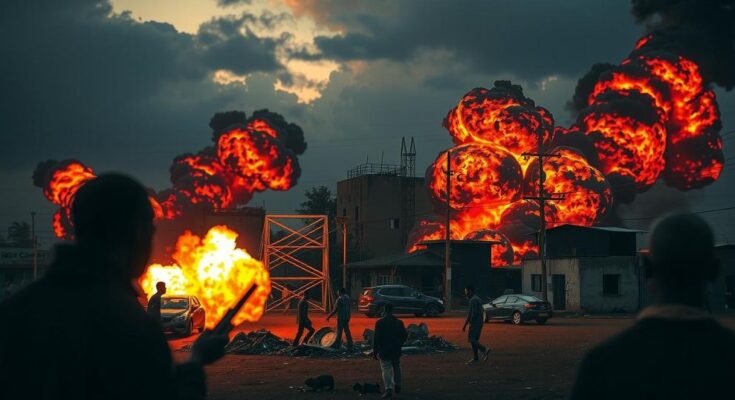Heavy gunfire erupted in Juba, South Sudan, near military headquarters on November 21, 2024. The shooting started at around 7 p.m. local time and persisted for over an hour. Tensions have escalated recently due to the dismissal of a long-serving intelligence chief and postponed national elections.
On the evening of November 21, 2024, heavy gunfire was reported near a military headquarters in Juba, the capital of South Sudan. Eyewitnesses noted that the gunfire commenced around 7 p.m. local time and persisted for over an hour, fluctuating in intensity. A military spokesperson indicated that efforts were underway to ascertain the cause of the shooting. This incident raises concerns amid a fragile political landscape, as South Sudan grapples with the aftermath of a violent civil war and ongoing power disputes between rival factions.
Since the cessation of the civil war in 2018, which resulted in the deaths of hundreds of thousands during a conflict between factions supporting President Salva Kiir and First Vice President Riek Machar, the nation has experienced relative stability. However, tensions have resurfaced recently, particularly after President Kiir dismissed Akol Koor Kuc, the intelligence chief, early in October, instating a close ally in his place. This move occurred shortly after the transitional government announced a second postponement of the national elections slated for December, further intensifying fears of potential unrest.
The recent gunfire episodes serve as a stark reminder of South Sudan’s precarious political state. Diplomats and analysts have observed a mounting tension in Juba, underscoring the fragile peace that has followed years of conflict. The landscape remains volatile, as the competing factions continue to navigate power-sharing agreements amidst the backdrop of postponed elections and political maneuvering.
South Sudan gained independence from Sudan in 2011, but the nation has since struggled with internal divisions leading to a brutal civil war that broke out in December 2013. This conflict primarily involved factions loyal to President Salva Kiir and First Vice President Riek Machar, resulting in devastating humanitarian crises and widespread violence. Peace agreements have been enacted, yet political rivalries and unresolved conflicts continue to present significant challenges to national stability. The transitional government’s effort to hold national elections has also encountered delays, exacerbating tensions among the ruling factions.
The eruption of heavy gunfire in Juba highlights the ongoing volatility in South Sudan, particularly as the nation seeks to stabilize its political environment following a long period of conflict. Dismissals of military leaders and delays in national elections contribute to unrest, captured by this latest outbreak of violence. The situation remains critical as military officials work to determine the circumstances surrounding the shooting, illustrating the fragile nature of peace in a region still healing from its tumultuous past.
Original Source: indianexpress.com




